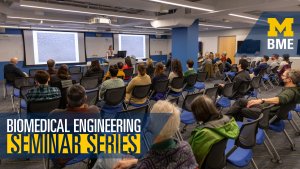Presented By: Biomedical Engineering
Cardiac mechanobiology: Modeling altered cardiac biomechanics across scales to understand mechanisms of disease
Biomedical Engineering BME 500 Seminar - Alison Schroer Vander Roest, Ph.D.

Abstract:
Many forms of cardiac disease, including myocardial infarction (MI) and hypertrophic cardiomyopathy (HCM), are characterized by changes in contractile function and tissue stiffness. Hypertrophic cardiomyopathy (HCM) is the most common inherited form of heart disease, and one of the most common sites of disease causing mutations is beta cardiac myosin, the motor protein responsible for contraction. While HCM is characterized clinically by muscle cell (cardiomyocyte) growth and hypercontractility, HCM mutations cause a diverse range of effects on the molecular function of myosin that has important implications for disease severity and treatment options. Using gene-edited human induced pluripotent stem cells in engineered environments, I measured the effects of these mutations at the cellular scale; namely: increased traction force generation, increased cell size, increased signaling of hypertrophic pathways, and altered cytoskeletal and cell junction organization. I have used computational models to link measured changes in molecular and cellular biomechanics, probed sources of cellular variability, and identified mechanisms of hypercontractility. In addition to cardiomyocyte hypertrophy, myofibroblast activation contributes to fibrotic tissue remodeling in many cardiac conditions and is affected by changes in tissue mechanics and interactions with other cardiac cells. In my doctoral research, I found that therapeutic targeting of a cadherin expressed in myofibroblasts and inflammatory cells after MI can limit harmful remodeling. My research leverages engineering tools to clarify the mechanical and biological mechanisms of cardiac disease and can help inform the development and application of new therapies for HCM and other cardiac diseases.
Bio:
Alison Schroer Vander Roest received her undergraduate degree in biomedical engineering at the University of Virginia. She then received a PhD in biomedical engineering at Vanderbilt University with Dr. Dave Merryman, studying fibroblast mechanobiology and the role of cadherin-11 in fibrotic and inflammatory remodeling after myocardial infarction. After completing her doctoral work, Dr. Vander Roest pursued postdoctoral training at Stanford University as part of a collaborative team between the mechanical and bioengineering, biochemistry, and pediatric cardiology departments. Her project at Stanford has been co-mentored by Dr. Beth Pruitt, Dr. Jim Spudich, and Dr. Dan Bernstein and aims to understand mechanisms linking mutations in beta-cardiac myosin to phenotypes of hypertrophic cardiomyopathy using stem cell models and engineered environments. Dr. Vander Roest has also developed collaborations to incorporate transcriptome analysis, FRET tension sensors, and computational modeling of myosin kinetics to better understand cardiomyocyte mechanobiology. This project has been awarded a K99/R00 Pathway to Independence Award that will fund future research into multiscale mechanisms of cardiac disease.
Zoom Link: https://umich.zoom.us/j/96508834308
Organized by:
Dr. Brendon Baker,
Assistant Professor, Biomedical Engineering
Dr. David Nordsletten,
Associate Professor, Department of Biomedical Engineering and Cardiac Surgery
Many forms of cardiac disease, including myocardial infarction (MI) and hypertrophic cardiomyopathy (HCM), are characterized by changes in contractile function and tissue stiffness. Hypertrophic cardiomyopathy (HCM) is the most common inherited form of heart disease, and one of the most common sites of disease causing mutations is beta cardiac myosin, the motor protein responsible for contraction. While HCM is characterized clinically by muscle cell (cardiomyocyte) growth and hypercontractility, HCM mutations cause a diverse range of effects on the molecular function of myosin that has important implications for disease severity and treatment options. Using gene-edited human induced pluripotent stem cells in engineered environments, I measured the effects of these mutations at the cellular scale; namely: increased traction force generation, increased cell size, increased signaling of hypertrophic pathways, and altered cytoskeletal and cell junction organization. I have used computational models to link measured changes in molecular and cellular biomechanics, probed sources of cellular variability, and identified mechanisms of hypercontractility. In addition to cardiomyocyte hypertrophy, myofibroblast activation contributes to fibrotic tissue remodeling in many cardiac conditions and is affected by changes in tissue mechanics and interactions with other cardiac cells. In my doctoral research, I found that therapeutic targeting of a cadherin expressed in myofibroblasts and inflammatory cells after MI can limit harmful remodeling. My research leverages engineering tools to clarify the mechanical and biological mechanisms of cardiac disease and can help inform the development and application of new therapies for HCM and other cardiac diseases.
Bio:
Alison Schroer Vander Roest received her undergraduate degree in biomedical engineering at the University of Virginia. She then received a PhD in biomedical engineering at Vanderbilt University with Dr. Dave Merryman, studying fibroblast mechanobiology and the role of cadherin-11 in fibrotic and inflammatory remodeling after myocardial infarction. After completing her doctoral work, Dr. Vander Roest pursued postdoctoral training at Stanford University as part of a collaborative team between the mechanical and bioengineering, biochemistry, and pediatric cardiology departments. Her project at Stanford has been co-mentored by Dr. Beth Pruitt, Dr. Jim Spudich, and Dr. Dan Bernstein and aims to understand mechanisms linking mutations in beta-cardiac myosin to phenotypes of hypertrophic cardiomyopathy using stem cell models and engineered environments. Dr. Vander Roest has also developed collaborations to incorporate transcriptome analysis, FRET tension sensors, and computational modeling of myosin kinetics to better understand cardiomyocyte mechanobiology. This project has been awarded a K99/R00 Pathway to Independence Award that will fund future research into multiscale mechanisms of cardiac disease.
Zoom Link: https://umich.zoom.us/j/96508834308
Organized by:
Dr. Brendon Baker,
Assistant Professor, Biomedical Engineering
Dr. David Nordsletten,
Associate Professor, Department of Biomedical Engineering and Cardiac Surgery